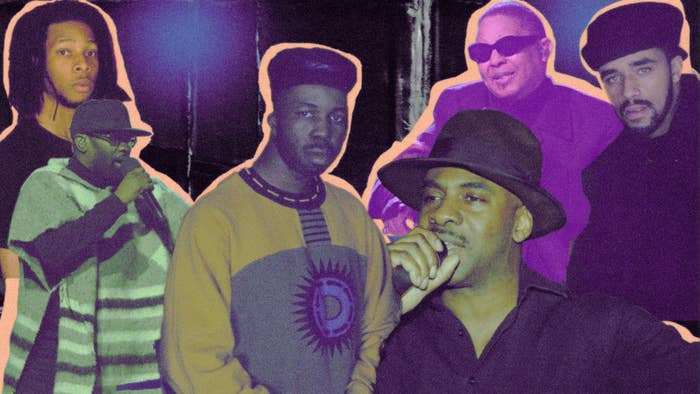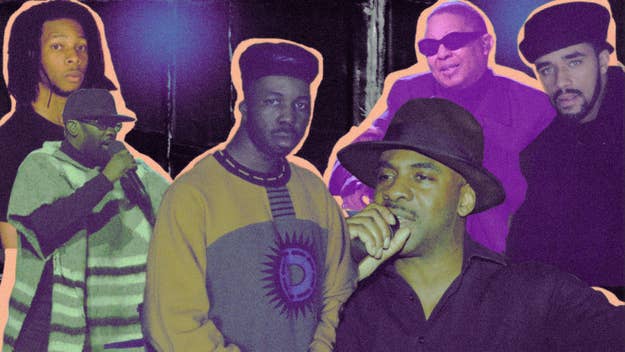
1. Mr. Q
The late Jay W. McGee, who passed away in 2021 at age 70, will go down in Canadian history as the man who rapped and released the country’s first hip-hop single, “Ladies Delight”—and first diss track. The MC-turned-Juno-nominated-R&B soul singer, an American who had relocated to Toronto, cut the song weeks after The Sugarhill Gang’s 1979 smash, “Rapper’s Delight,” which hit No. 1 in Canada. Originally, this distinction of being first was usurped (despite their apparent protestation) by white duo Singing Fools’ 1982 single, “The Bum Rap.”
2. Maestro Fresh Wes
Wes Williams is the undisputed Godfather of Canadian Hip-Hop. The Toronto native and Canada’s Walk of Fame inductee was the first Canadian Black artist to achieve a domestic platinum-selling album, 1988’s Symphony in Effect, signifying, at the time, sales of 100,000 units. His debut single, “Let Your Backbone Slide,” holds the distinction of being the first Canadian rap single to go gold (then 50,000 units) and the first to chart on Billboard’s Hot Rap Singles. For 20 years, it was the best-selling Canadian rap single in history, until Kardinal Offishall’s “Dangerous” in 2008.
3. Farley Flex
Behind Maestro’s early career was manager Farley Flex. Entrepreneurial from a young age after an injury derailed his football aspirations, he started putting on breakdance competitions in the early 80's. He often tells the story of the bank being suspicious when he, just a kid, went to deposit a whack of cash he made from a legit party. Flex was instrumental in launching Canada’s first hip-hop station Flow 93.5 in 2001, where he was music director and VP of business development. Two years later, he went on to national fame as a judge on Canadian Idol (2003-2008). The Black activist and youth mentor has received numerous recognitions, including the prestigious Harry Jerome Award.
4. Main Source
The hip-hop group—originally comprised of Canadian brothers K-Cut (Kevin McKenzie) and Sir Scratch (Shawn McKenzie), and American Large Professor (William Paul Mitchell), who was later replaced by Mikey D (Michael Deering)—was founded in 1989 and released its groundbreaking debut album, Breaking Atoms, in 1991. While they are not a household name, the short-lived crew is influential on the scene, particularly for its songwriting and production techniques and choices (jazz and soul samples) to debuting a little-known American rapper called Nas on “Live at the Barbeque.”
5. Snow
When the rapper, born Darrin O’Brien, released his 1992 dancehall-based rap single, “Informer,” while serving prison time, it hit No. 1 on the Billboard Hot 100 chart for seven weeks. To this day, the only other Canadian rapper to do this is Drake (over and over). The inimitable rapid-fire MC with the Jamaican (by-way-of-the-Allenbury-projects) patois sold over 8 million copies of his debut album, 12 Inches of Snow. It remains the best-selling and highest charting reggae single in U.S. history. The song had a recent resurgence in Daddy Yankee’s “Con Calma," where Snow was featured.
6. Denham Jolly
The businessman, Black leader, activist and mentor, now 87, fought hard against racial barriers and stereotypes to get the CRTC license for the first-ever Black-owned and operated radio station in Canada, through Milestone Radio Inc. of which he was president. It reportedly took a dozen years, finally granted in 2000. Toronto’s FLOW 93.5 (CFXJ-FM) went to air in Feb. 2001, the country’s first commercial hip-hop radio station. Regardless of CanCon regs, it happily gave opportunities to dozens of homegrown talent, including Drake’s first spins.
7. Ghetto Concept
Often cited as a major influence by their younger successors, the path-paving duo of Kwajo Cinqo and Dolo—briefly a trio with rapper Infinite—was the first Canadian street rap group to air on BET. Their debut single, 1992’s “Certified,” and follow-up, 1993’s “E-Z On Tha Motion,” (with Infinite), on label Groove-a-lot, both won consecutive Junos for Best Rap Recording. They released 1998 eponymous debut album on their own label 7 Bill$, which included Juno-nominated “Krazy World." Then there's classic “Still Too Much,” later remixed with guests Maestro, Snow, Kardinal Offishall, Red-1 and Ironside.
8. Sol Guy
In his teens, the one-time member of Vancouver’s Rascalz (then called Ragga Muffin Rascals) soon started managing his boyhood friends with whom he co-founded hip-hop label Figure IV Entertainment in 1994. His drive, innovation and ability to talk to the corporate execs landed him a job at Toronto’s BMG Music Canada, where he began changing the focus and structure from within, first as the urban marketing manager. Then a 1995 trip to Sierra Leone with Rascalz for War Child Canada changed his life forever and he began prioritizing social entrepreneurship/ethical business through the arts. He went on to manage and develop k-os and K-naan and was later hired by Arista in New York as director of international artist development.
9. Ivan Berry
The co-founder of management company Beat Factory (with Rupert Gayle), which launched in 1982, helped secure countless publishing and record deals for Canadian artists, including Michie Mee to Atlantic, making her the first Canadian hip-hop act to sign with a major, and Tom Green’s Organized Rhyme to A&M. He also managed Dream Warriors. Five years later, Berry created the label offshoot Beat Factory Music, distributed by EMI Music Canada and BMG Music Canada. His Rap Essentials compilations introduced the country to acts like Kardinal Offishall and Dan-e-o. He was head of A&R and international for Sony BMG Canada from 2000-2004.
10. Dream Warriors
Formed in 1988, and signed to 4th & B-way/Island Records, jazz-infused hip-hop innovators King Lou and Capitol Q sold more than 800,000 copies of their 1991 debut album, And Now The Legacy Begins, spawning two top 20 singles in the UK, and a gold record at home (then 50,000 copies). “My Definition of a Boombastic Jazz Style”—which uses a Quincy Jones sample, best known in Canada as the theme to TV game show Definition—remains a classic. They were the first group to win a Juno Award for Rap Recording of the Year in 1992. That year, they also recorded a song for the Buffy the Vampire Slayer soundtrack. In 1994, they added Spek and DJ Luv to the lineup, and released Subliminal Simulation and 1996’s The Master Plan. The Legacy Continues…dropped in 2002, and all these years later their legacy runs deep.


